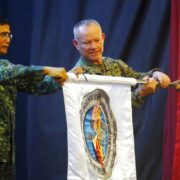Philippine and U.S. military forces began on Monday, May 7, their annual military exercises — the first and largest since Philippine President Rodrigo Duterte entered office.
The annual Balikatan exercises — now in its 34th year — launched in Camp Aguinaldo, Quezon City with around 8,000 soldiers from the two countries. Nearly 3,000 soldiers from the U.S. joined with approximately 5,000 from the Philippines, and will work alongside soldiers from the Australian Defense Force and the Japan Self-Defense Force.
U.S. and Philippine officials commended the longstanding relationship between the two countries dating back to World War II.
“Each year, through Balikatan, we reaffirm our commitment to each other under the mutual defense treaty and conduct an array of multilateral training opportunities to help us develop as allies,” said U.S. Lt. Gen. Lawrence Nicholson, commanding general of III Marine Expeditionary Force. “We as military are charged with being ready when our nations need us most.”
Armed Forces of the Philippines (AFP) Lt. Gen. Emmanuel B. Salamat, exercise director for this year’s exercises, said, “I’m greatly honored to stand side-by-side with our U.S. military counterpart to share our mutual responsibility and commitment in making this Phil-U.S. bilateral exercise a success.”
“We extend this commitment to strengthen our alliance and learn from both forces to improve our interoperability,” Salamat added.
The drills come shortly after China installed anti-ship cruise missiles and surface-to-air missile systems on three of its outposts in the South China Sea, as reported by NBC.
But officials, not mentioning China, said the focus of the Balikatan exercises will be focused on missions including mutual defense, disaster relief, humanitarian assistance, and counterterrorism.
Lieutenant Liezl Vidallon, a spokesperson for the Balikatan exercises, told Rappler last month that humanitarian civic action activities, including medical missions and school buildings in areas in Cagayan and Central Luzon, would also be featured.
The drills also come nearly a year after U.S. special forces came to the Philippines to aid local troops fight against ISIS-backed Islamist militants who took hold of the southern Philippine city of Marawi last May.
“We want both our forces to learn from our great and hard-earned experience in our past battles like Marawi,” said Salamat. “We just want to help each other to be able to effectively combat future scenarios.”
While in Marawi, U.S. soldiers were only able to provide technical support as local laws prohibit troops to take part in combat.
Salamat said that by the end of the Balikatan exercises, they expect both countries’ troops to learn from each other, from both training and “hard-earned experience of both our forces.”
“May this exercise add value on only in the spirit of our U.S.-Phil Mutual Defense Treaty engagement and friendship of our armed forces, but also in our commitment to better perform our mandate in protecting our people and state,” said Salamat.
“Our alliance remains a key source of strength and stability in the Indo-Pacific region,” said Nicholson. “It is paramount to recognize that Balikatan is a training opportunity that will test and enhance our readiness while strengthening the bond between our nations.”
The drills and operations will continue until May 18. (Rae Ann Varona / AJPress)






